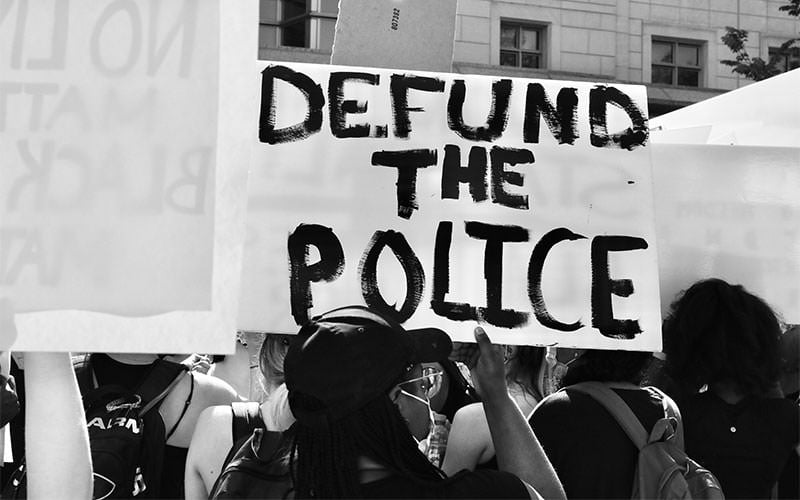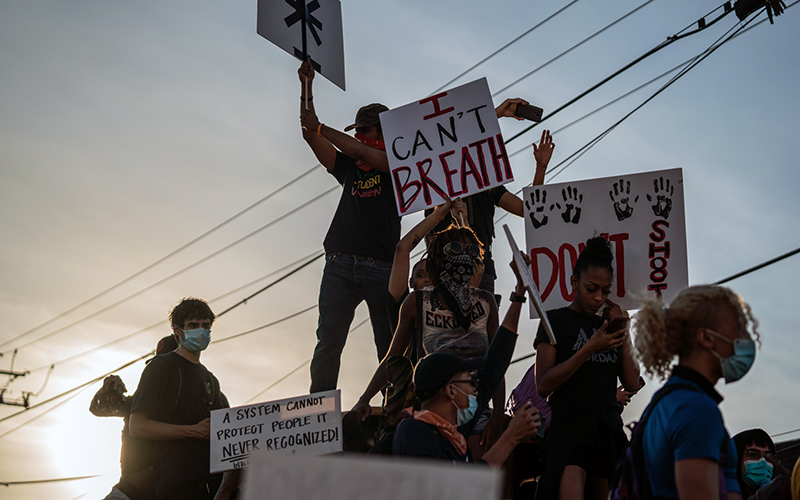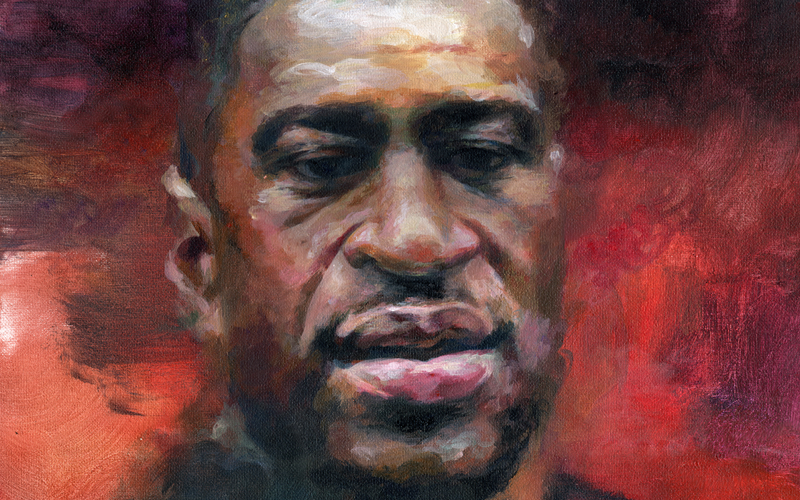PHOENIX – A years-old movement to reform police departments, which reentered the national debate last spring when a Minneapolis police officer dug his knee into George Floyd’s back until he couldn’t breathe, has taken root in Arizona.
“No justice, no peace, defund the police!”
The chant is a nationwide call to action, voiced by millions at protests, on social media and at city halls across the U.S. and in Arizona, where some police departments claim a quarter of a city’s annual budget.
Defunding the police, which has long been sought by groups battling police violence against African Americans and other people of color, has gained traction in the past three months. Several cities recently have reduced funds for police budgets.
Leaders in Phoenix – which has one of the highest rates of police shootings in the country – approved a city budget in June that left police funds intact but allocated $3 million for a civilian review system. The fiscal 2021 budget gives law enforcement $745 million.
In Phoenix, Tucson, Mesa, Glendale and elsewhere in Arizona, reformers are calling on city councils to redirect funds to such areas as mental health services, and in some cases to disband their police departments. Police advocates say that would be a mistake, unraveling law enforcement’s central mission to protect and serve the public.
The defund movement is vibrant in many U.S. cities.
In June, the Minneapolis City Council unanimously voted to disband the police department and vowed to create a “transformative new model.”
“We acknowledge that the current system is not reformable – that we would like to end the current policing system as we know it,” City Council member Alondra Cano told CNN.
The Boston City Council is planning to do just that. Mayor Marty Walsh announced the city will reallocate 20% of the police overtime budget – $12 million – to community programs focused on inequality.
In Sacramento, California, Mayor Darrell Steinberg proposed spending $5 million for a new department that, instead of law enforcement, would respond to 911 calls involving noncriminal activity.
Along with the new department, Steinberg is calling for the creation of an inspector general who would fully and publicly investigate any officer-involved shooting, any death while in police custody and police use of force that results in serious bodily injury.
Los Angeles, San Francisco, New York, Austin, Texas, and Portland, Oregon, are among U.S. cities that have reduced funding of police departments in response to demands for change.
Phoenix activist Chris Love, 42, said most of the money spent on police in Arizona could be put to better use elsewhere.
“I think that we’ve seen kind of some of the creeping back of a lot of the things that other folks would call gains,” she said. “And part of that is looking at policing and the overreliance on police departments, as opposed to really taking a look at taking care of our most vulnerable citizens and making sure that we have the resources to provide them whatever services they need.”
Police also have defenders and those who strike a middle-of-the road approach.
On Twitter in June, Phoenix City Council member Sal Diciccio said officers are doing the best they can and the idea of defunding police is “a total slap in the face to our entire department.”
Kevin Robinson, a former assistant police chief in Phoenix, said dismantling police departments isn’t the answer, but reforms are needed to rebuild public trust.
“I would like to see police departments start policing with the communities as opposed to policing at the communities,” said Robinson, an instructor at Arizona State University’s School of Criminology and Criminal Justice. “They need to sit down and not be afraid to talk about the things that they are upset with, about their police department.”
Robinson said redirecting money and responsibilities to other programs could be effective.
“I would suggest that people look long and hard at things within the police department that maybe don’t need to move forward, different programs that may not need to be funded for future use,” he said.
State Rep. Andrés Cano, D-Tucson, said change in Arizona must be statewide to be successful and sustainable, and he urged Gov. Doug Ducey to call a special session of the Legislature.
“We need to have a statewide conversation about how law enforcement and our state agencies and our local jurisdictions are going to do a better job,” Cano said. “I think that conversation is only possible if we get serious and bring back all 90 legislators to the state Capitol and have this governor offer a realistic proposal.”
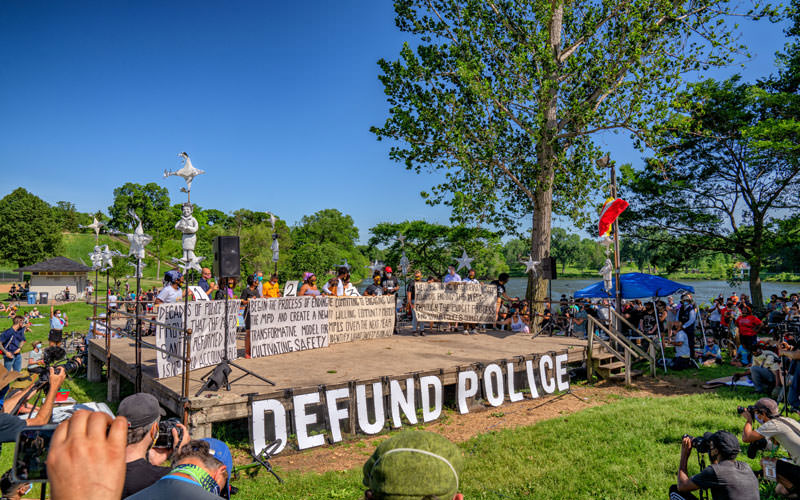
The Minneapolis City Council has pledged to dismantle the police department, vowing to create a “new transformative model” of modern policing. (Photo courtesy of Tony Webster/Creative Commons)
Historic calls for reform
Defunding police has gained a great deal of attention in the past few months, but calls for police reforms stretch back to at least the 1980s. The death of James Mincey Jr. in 1982, the videotaped beating of Rodney King in 1991, the rise of street gangs and the crack cocaine epidemic brought light to issues within the Los Angeles Police Department. King’s savage treatment after a police chase led to riots in 1992 when the white officers who beat him were acquitted.
Moves to defund the police come as Americans’ attitudes toward police are changing, according to a Pew Research Center report.
“The share of white Americans who say police are doing an excellent or good job of holding officers accountable for misconduct has fallen from half in 2016 to about one-third today (34%),” it said. “The share of Black Americans who say this has also declined, from 21% to 12%.”
Public perception of the role of police departments also is shifting, especially considering the chronic underfunding of programs for mental health and people who are homeless.
The movement to defund police departments exists on a spectrum of reform, according to Jose Jaurez of Phoenix, a Twitter activist.
“Defunding is a word that encompasses a lot of different concepts,” he said. “Anybody who wants to just stop at the word ‘defund’ itself, and treat that word as if it has no other implications, is just showing an unwillingness to talk about the fact that art programs are always being defunded, education programs. It’s just the reality of an economy and a budget.”
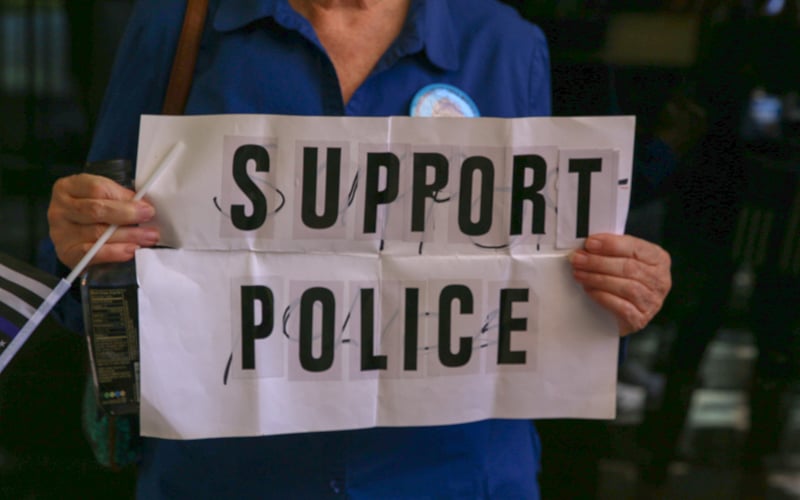
Although some advocates seek to dismantle police departments, others believe society can’t function without the current system. (File photo by Elly Lundberg/Cronkite News)
Redirecting money to other programs
Defunding the police doesn’t always mean eliminating police departments entirely, but rather dismantling some of the systems on which they were built.
“I think a more accurate phrase, term or a definition would be the reallocation of funding from police departments,” said Robinson, who was assistant chief for 13 of his 36 years with Phoenix police.
Love said redirecting part of the funds for police departments to other programs makes sense.
“We’re really talking about taking those resources and reallocating them to things like behavioral health, any kind of social services, really taking a look at our education system and putting those funds into place so that we can address the issues that police are always called to address anyway,” she said.
Critics say defunding police would negatively affect cities, and they argue the current system protects citizens. Defunding or disbanding law enforcement agencies may be too radical and a concept more imaginary than realistic, said José Borrajero, a political activist and member of the Arizona Latino Republican Association.
“We’re addressing the wrong issue here,” he said. “The issue is not of the police being good or bad, the issue is not whether the police should get money or not, the issue is that there are a few rotten apples within the police department. If you’re going down the road and speeding, should everybody be pulled over because one person was speeding? No, you pick out the person that was speeding and then give them the ticket.”
DiCiccio echoed that sentiment in a June meeting of the Phoenix City Council.
“We’ve heard this constant attack on our police,” he told the council. ” They’re violent, they’re this, they’re that. No, they’re not. They are good people. These are individuals that have protected us. They’re doing everything they can, they have families, they have children, they go to church on Sundays, they do everything right in their life and they have to endure this kind of stuff, I think it’s just horrifying.”
Some questions arise whether defunding the police makes it harder for them to protect residents.
“You have to ask yourself the question: Who is going to investigate homicides? Fatal car accidents, armed robberies, assaults?” Robinson asked. “There’s a litany of things, obviously, that the police do, so without a police department, you have to ask yourself, ‘Who’s going to do that?'”
Cano said defunding the police is an issue of equity.
“As a lawmaker, the fact is that when I review the budget, there’s something wrong when we’re spending more on our prisons than we are on our three state universities combined,” he said. “We’re asking for more funding to the community programs and the social service agencies that ultimately improve quality of life, education funding, housing opportunity and making sure that folks have food on the table.”
Love said affordable housing, unemployment, rampant homlessness, mental health and education are some of the main areas that require additional funding.
Arizona has the eighth worst high school graduation rate in the nation, with only 79.5% of students receiving a diploma, compared with the national average of 84.1%, according to USA Today. At the same time, Arizona spends $8,131 per pupil per year on its public schools, the second lowest in the nation, it said.
“We need to know that this system in Arizona especially needs an education overhaul, It’s one of the worst educations in this entire nation,” said Perry Christian, 27, who works with the W.E. Rising Project. “For there to be so much money into policing, then to have the worst education, where’s the balance?”
Robinson said those calling for the reallocation of police funds need to “look at ways to refund those moneys or repurpose those moneys and relocate them to some social service program, mental health programs, something that would then help everybody.”
A 2018 study by the U.S Police Foundation showed that 95% of Phoenix police officers had completed mental health crisis-intervention training. However, when community members were asked how the department responded, “44.8% indicated the officer(s) made the situation worse, and 50.9% responded that when the PPD took them to jail, the officer(s) did not offer mental health assistance, and/or did not ask mental health questions before taking them to jail.”
“We have to understand that police departments have become the answer to all of our society ills,” Robinson said, “and it’s not a bad thing. But we have to understand that police officers are not necessarily trained, at least not trained well enough to deal with somebody who may have a mental illness.”
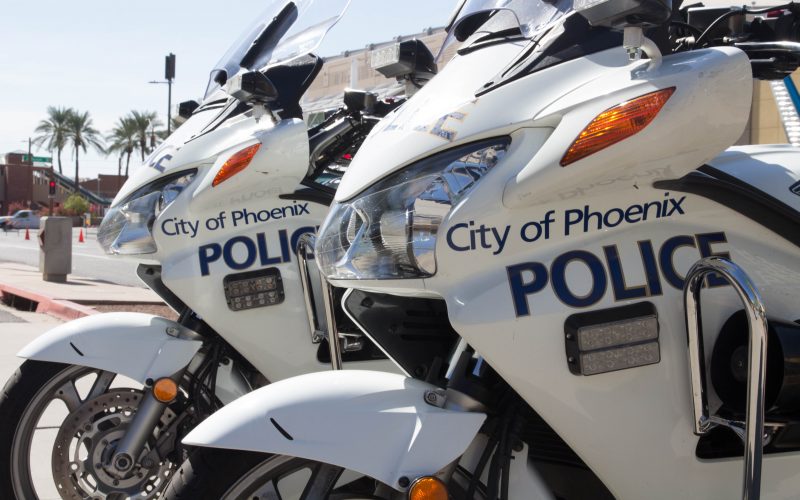
Kevin Robinson, a former assistant police chief in Phoenix who now teaches criminal justice at Arizona State University, says reforms are needed to build public trust, but dismantling police departments isn’t the answer. (File photo by Jasmine Spearing-Bowen/Cronkite News)
Commanding the lion’s share of city budgets
City governments have increasingly directed a major portion of annual budgets to law enforcement and prisons. President Lyndon Johnson launched a “war on crime” in 1965, which prioritized “law and order” and ushered in a new era of policing in America.
Police departments remain the best funded agency in most U.S cities, “with up to 20% to 45% of discretionary funds allocated to the violent system,” according to a June report by the Center for Popular Democracy, Law for Black Lives and the Black Youth Project.
In 35 of the 50 largest U.S. cities, police spending usually accounts for the largest share of the budget, according to a review by 24/7 Wall St., which notes that tracking funding can be difficult because cities budget differently. For example, Phoenix, the nation’s fifth largest city, does not oversee K through 12 schools, while New York has significant oversight of public education dollars.
New York spends more on education and social services, but the police budget for fiscal 2021 is $6 billion, about 6% of the city’s total budget of $95 billion. But in a sign that the defund movement has gained significant support, the city in June cut $1 billion from that proposed budget.
In Phoenix, activists were stymied in their efforts to cut the Phoenix Police Department’s 2020-21 budget by 25%, according to azcentral.com.The story says that the approved budget includes about $745 million for the department.
Phoenix spends more on law enforcement than it spends on any other service. In fiscal 2021, the police budget is about 22% of the total budget, according to the review by 24/7 Wall St.
“We’ve seen it in LA,” Love said, “where they’re talking about defunding the police, we’ve seen it in Minneapolis, where all of this is pretty much started, we’re seeing them talk about defunding the police. We’re seeing it in New York City. There’s no reason that we shouldn’t be having the same conversation in the city of Phoenix, given our size and given our population.”
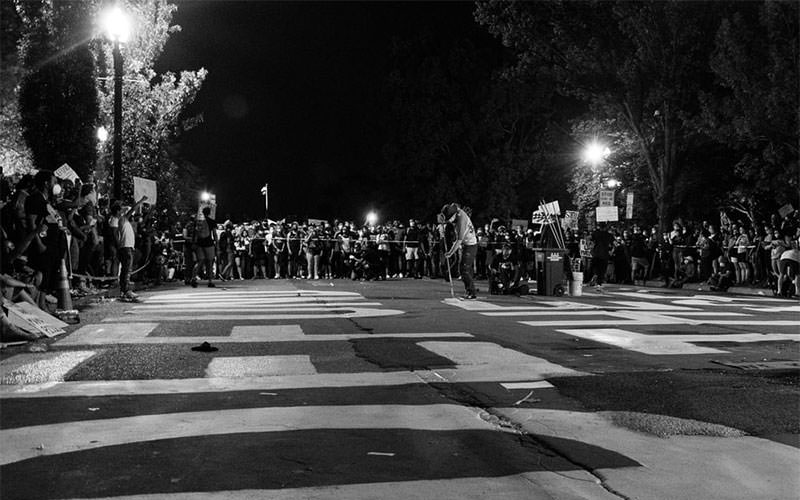
Black Lives Matter protesters in Washington, D.C., in June paint “Defund the police” on a city street. Communities across the country are considering measures to reallocate law enforcement funds to other programs, such as mental health. (Photo courtesy of Koshu Kunii/Unsplash)
Police violence in Arizona
Activists have evoked not only George Floyd, who was killed May 25, but also Dion Johnson, 28, who was shot to death the same day by an Arizona Department of Public Safety trooper who found Johnson asleep in his vehicle near an interstate on-ramp.
“Phoenix police is a problem, they take it too far, they killed Dion Johnson for sleeping in his car,” chanted Phoenix residents gathered outside the City Council chambers in June.
In 2018, Phoenix police officers fired more shots at people than officers in any other major U.S. city, according to an investigation by the The Arizona Republic. The average age of those shot by police was 35, the majority were not white, and a shooting occurred every five days, the Republic reported.
The same day the City Council approved the police budget, it earmarked $3 million toward creation of the Office of Accountability and Transparency for improved civilian oversight of the department’s relationship with the community.
Jammar Williams, an organizer of Black Lives Matter Phoenix Metro, called the office “the first step in a series of actions” necessary to bring about the reforms Phoenix residents demand.
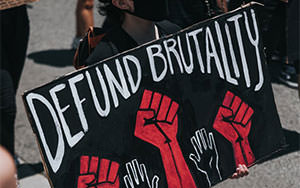
Many police reformers believe American law enforcement agencies are overmilitarized, resulting in improper use of force against the people they’ve pledged to protect and serve. (Photo courtesy of Nathan Dumlao/Unsplash)
“Cities across the nation are learning that defunding the police is actually something that moves you into the future and is actually more of a progressive idea than creating civilian oversight,” Williams said. “The city of Phoenix should never have gone this long without civilian oversight.”
Arizonans want “programs that we can truly benefit from and are going to create safety for us in ways that we’ve needed for a very long time,” Williams said.
Robinson, the former Phoenix assistant police chief, said the oversight board is a smart move toward greater transparency, adding that other police departments need to embrace similar changes.
“I think we’re better than we used to be, but I don’t think we’re as good as we’re going to be,” he said. “There is always room for improvement, you need to think outside of the box and look for other ways to accomplish or to deal with some of these problems that law enforcement is facing.”
In June, Phoenix Police Chief Jeri Williams joined the Police Reform and Racial Justice Working Group, according to KTAR. Williams also has been seen walking alongside protesters who gathered in downtown Phoenix to protest police injustice and praising police officers who took a knee to honor victims of police violence.
“I’m sure the police chief is a great person as an individual, but when she puts on her uniform, when she puts on that badge, that is the entity and the role that we’re critiquing” said Jammar Williams, who is not related to the chief. “Take a knee and be human, great, but I want you to do something about this system, I want you to do something about your job and your function as a public servant and the things that I’m upset about when you do your job out in the streets.”
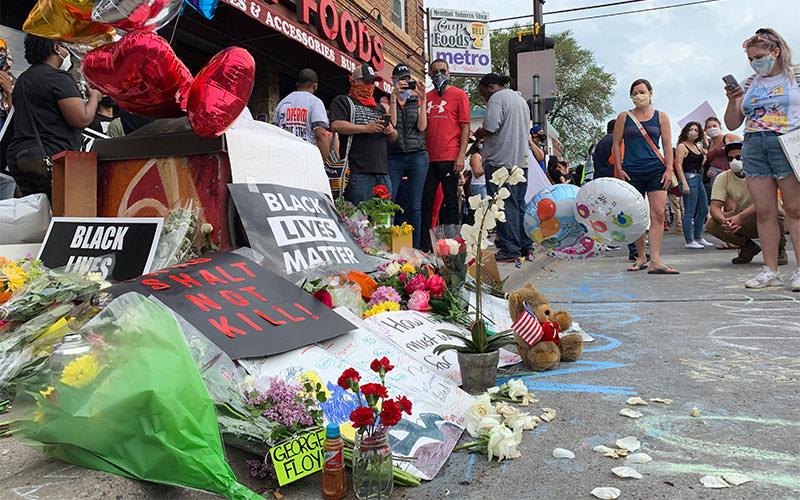
A memorial outside Cup Foods in Minneapolis, near the spot where George Floyd died in May. The killing of Floyd and other Black Americans by police has fueled a controversial movement to redirect portions of police budgets to other needs, with opponents arguing it would leave people without protection. (Photo courtesy of Lorie Shaull/Creative Commons)
Complicated history, uncertain future
The model of modern policing has shifted over the past century. Some issues within the system may arise because of the mindset officers develop through training, which has led to police departments becoming overmilitarized and overly aggressive, said William Terrill, an ASU criminology professor and associate dean in the Watts College of Public Service and Community Solutions.
“I think a bigger element here is the mindset of the officer and who is recruiting them and how they’re being socialized into the occupation,” Terril said. “That’s where the police culture comes into play. There’s a reason officers have suspicions, and it’s a very unique occupation.”
The genesis of modern American policing was born in the South, where police forces developed from groups known as “slave patrols” in 1704, according to the History of Policing in the United States, by researcher Gary Potter of Eastern Kentucky University.
“Slave patrols had three primary functions: (1) to chase down, apprehend, and return to their owners, runaway slaves; (2) to provide a form of organized terror to deter slave revolts; and, (3) to maintain a form of discipline for slave-workers who were subject to summary justice, outside of the law, if they violated any plantation rules,” Potter wrote.
In the 19th century, police forces emerged from private groups that were a response to “disorder.” Eventually, taxes and political influence allowed for the development of professional and bureaucratic policing institutions that equated crime control with social control. Potter wrote that early police departments operated with the goal of controlling “dangerous classes” and had two primary characteristics: “They were notoriously corrupt and flagrantly brutal.”
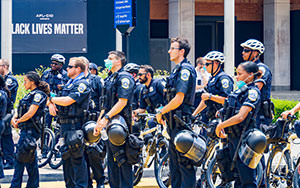
Police block a street during a protest in Washington, D.C. Phoenix City Council member Sal Diciccio says the idea of defunding police is “a total slap in the face to our entire department.” (Photo courtesy of Ted Eytan/Creative Commons)
Terril said the military model of policing continued to develop in the mid-1980s with reform-based policies.
“The notion of that community policing movement was very much what we’re facing now, 40 years later, it was the idea that the police are being too militaristic and we need to be more community based,” Terril said.
The Black Lives Matter movement launched in 2014 after the death of Michael Brown at the hands of police in Ferguson, Missouri. Once controversial, the organization now is widely recognized for advancing human rights.
Americans’ approval of Black Lives Matter has increased by nearly 16 percentage points since 2017, with 53% of Americans in support, 28% opposed and 18% saying they neither support nor oppose the movement, according to a survey in June by Civiqs, an opinion polling company.
Activists say the turmoil over police killings of people of color, global protests in George Floyd’s name and a recognition of the nation’s long history of racial injustice may be a turning point.
Williams, of Black Lives Matter Metro Phoenix, said defunding and disbanding police departments is neither radical nor unrealistic. He describes it as a reasonable solution to the issues of modern policing in America.
“Why are we convincing ourselves that we have no ability to imagine a society where we don’t need police?”
– Cronkite News reporter Misha Jones contributed to this report.

